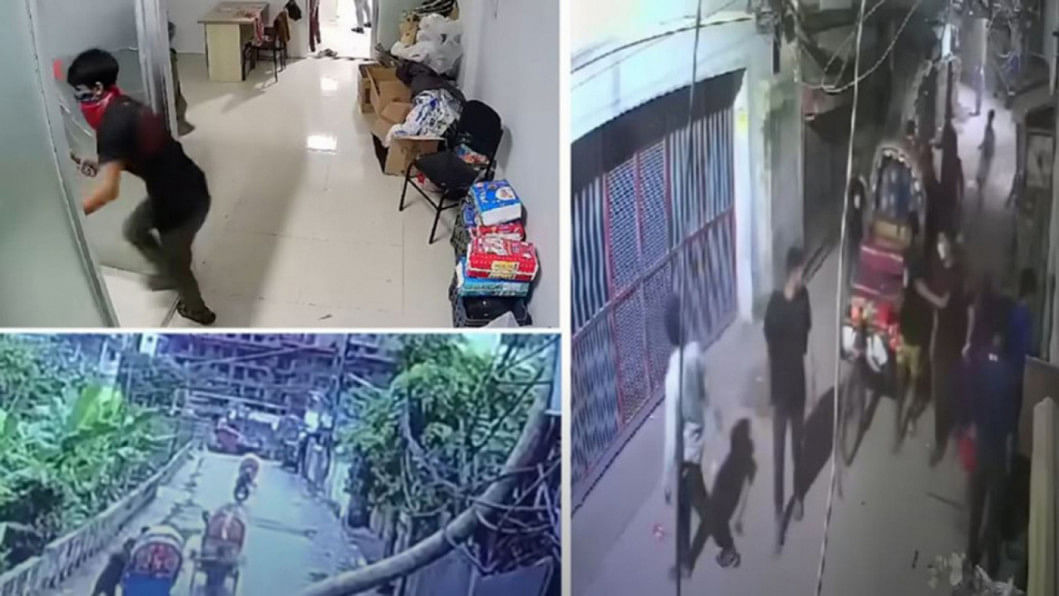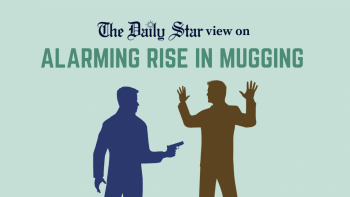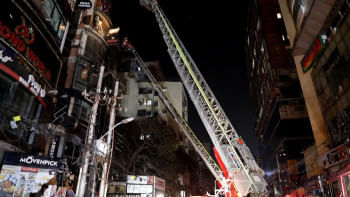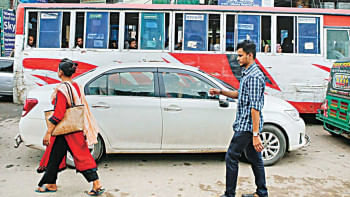Will the home adviser go big or go home?

As soon as the sun sets and evening descends down upon the city, the residents of Shekhertek Road No. 6 in Dhaka's Mohammadpur area ramp up measures to secure their homes. The streets become almost deserted as pedestrians rush to get away from open roads. An eerie feeling of impending danger lurks in the air. For the residents of Shekhertek Road No. 6, this has become the norm after a series of incidents of mugging, snatching and robbery—at least one in broad daylight—in the surrounding areas have left them scarred.
This is not the picture of that one particular road alone; it reflects the current atmosphere of fear in Dhaka. Post-August 5, muggers, robbers, and criminals run rampant in the city as the law and order situation has fallen to an all-time low. With this appalling state, public trust in law enforcement agencies have also degraded. What is baffling, though, is that the guardian entity of our law enforcement agencies is not willing to take any of it.
The Ministry of Home Affairs has long been a subject of great criticism in the political reality of Bangladesh. From Lutfozzaman Babar's "We are looking for shotrus" to Sahara Khatun's "We can't provide protection in people's bedrooms," the home ministers' false promises and lack of accountability have been a part of this country's political history. The ministry's legacy took its darkest turn during the July uprising last year, when a video footage of a police officer went viral. "Sir, we kill one, only one dies, but the rest remain," the police officer was heard saying to the then Home Minister Asaduzzaman Khan.
After the previous regime's fall, three days passed without any law enforcement on the streets. People took it upon themselves to stay up all night and guard their neighbourhoods against robbers and thieves. There were also community efforts to guard minority religious places and public property against vandalism. The metropolitan area breathed a sigh of relief when the interim government led by Prof Muhammad Yunus took office with the promise of sweeping reforms. Even then, for a good few weeks, police stations were empty as police themselves suffered significant damage following the regime's fall since protesters retaliated against indiscriminate killings.
We hoped that, despite everything, a new political reality would emerge with these winds of change. We hoped that we were truly about to get a new Bangladesh—the much heralded Bangladesh 2.0. A rebranded Bangladesh where law enforcement agencies will not be our enemies, but our friends and guardian angels. We even saw students greeting police officers with flowers when they resumed their duties on the streets. Five and a half months on, we are beginning to realise that this hope of a new political fantasy might just turn out to be a fantasy.
Since Lt Gen (retd) Md Jahangir Alam Chowdhury took office as the home affairs adviser, succeeding Brig Gen (retd) M Sakhawat Hossain who held the office for only a few days, he has effectively failed to curb the skyrocketing crime rates across the country, particularly in Dhaka city. A report by this daily highlights that in September 2024, as many as 148 murder cases were filed in the city, rising from 119 in August. Thirty-three cases of mugging were reported—at least one in broad daylight—rising from 14 in August.
The situation did not improve drastically in the following months of October, November or December; despite joint operations by law enforcement agencies, the atmosphere of fear and danger and the general feeling of unsafety in the roads still reign in the city. From mob violence to petty crimes, only the privileged class can truly claim that they or their friends and family have not become victims of crime in recent times. Social media is flooded with rising complaints by women that they are scared to go out after dark, mainly due to the increase in the number of harassers on the streets.
Attacks on minorities and the destruction of shrines are other examples of ineffectiveness of our law enforcement agencies and their custodian, the home ministry. There are countless footage of people attacking these shrines; why are law enforcement agencies unable to identify the perpetrators and take action? What happened to the Students of Sovereignty members who attacked Indigenous students with cricket stumps on January 15? We know two were arrested and were paraded in front of the media, but the others remain at large. There's the allegation that several key perpetrators of the July massacre—the ministers, police officers—were able to flee the country. How can the law enforcement infrastructure of the country let them slip through?
We must ask: why are the law enforcement agencies simply not working? On the one hand, criminals are clearly not afraid of repercussions; and on the other, citizens have no confidence in the custodians of their security. Why is the home ministry failing to control its forces?
The interim government can argue that the crime rates have not shockingly gone up compared to last year, and that the law enforcement agencies, still reeling from the blow of the uprising where they faced the brunt, are struggling to find their foothold back. It can argue that the intelligence network is broken and the red tape of the old bureaucracy is holding them back. It can argue a lot and that all may be true, but what's also true is that we expected better—perhaps a rather unrealistic high expectation. But the interim government failed to even reach the minimum bar when it came to restoring law and order across the country. At least, we expected a sincere acknowledgement of the ground situation and a solid game plan from our home affairs adviser. Instead of doing any of that, he has given vague statements whenever questioned. Repeatedly, the adviser has remarked that "law and order has improved," but people hardly feel so.
Clearly, there remains more to be done. What we want is a clear acknowledgement of shortcomings, and a strongman approach in handling a critical institution like the home ministry. The job is to restore public faith in these institutions, and we haven't seen enough steps yet from the government.
In a new Bangladesh after the mayhem of July-August 2024, reinforcing law and order should have been one of the first priorities of the interim government to restore public faith in our broken institutions. With each passing day, people's confidence will keep deteriorating unless they see actionable outputs. The first step will be to restore law and order, and we are all looking at the home adviser.
The July uprising ushered in a new hope of a new Bangladesh where we expect accountability from our government bodies—accountability that was missing for 15 and a half years. We will continue to ask for accountability because the price we have paid for it is too high. If the home affairs adviser and his office cannot embody this culture of transparency and accountability even in five and a half months, maybe it's time to rethink this appointment.
Zarif Faiaz is a journalist at The Daily Star and a researcher at Tech Global Institute.
Rokaiya Shatadru is a graduate student of microbiology at Ohio State University, US.
Views expressed in this article are the author's own.
Follow The Daily Star Opinion on Facebook for the latest opinions, commentaries and analyses by experts and professionals. To contribute your article or letter to The Daily Star Opinion, see our guidelines for submission.

 For all latest news, follow The Daily Star's Google News channel.
For all latest news, follow The Daily Star's Google News channel. 










Comments